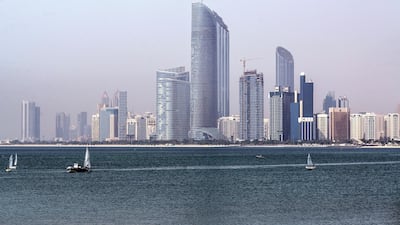The diverse international community of the UAE awoke just a few short weeks ago to yet more announcements from the country’s leadership about plans to further reform the economy.
Sheikh Mohammed bin Zayed Al Nahyan, Crown Prince of Abu Dhabi and Deputy Supreme Commander of the Armed Forces, announced the Tomorrow 2021 plan including 50 initiatives to spur growth in areas such as investment, job creation and improving the overall quality of life in Abu Dhabi.
At Deutsche Bank, we view Tomorrow 2021 as a potent catalyst for further growth and improved sustainability for the economy in Abu Dhabi and the wider UAE.
Deutsche Bank expects economic growth in the UAE to accelerate to 2.7 per cent or better in late 2018 and to top 3 per cent in 2019 due to growth in private consumption and non-oil exports. We are optimistic that the market's growth expectations next year will be met against a backdrop of improved crude oil markets and a more positive environment for foreign investments in the UAE driven in part by the recent reforms, and initiatives including Tomorrow 2021.
________________
Read more:
Tomorrow 2021: Abu Dhabi business leaders predict a stronger 2019
The UAE explained: What are the new plans for the economy and why do we need them?
_______________
International investors and partners to the UAE, including organisations like the IMF and World Bank, have long argued for these reforms to ensure the continued growth and prosperity of the UAE. For oil-producing Arabian Gulf economies, the move to re-calibrate their economies away from a reliance on oil is critical for future economic, and by extension social, prosperity.
The UAE’s efforts in this regard, particularly over the last two years, are laudable.
The four pillars upon which Tomorrow 2021 is built are: supporting and promoting business and investment in industry and renewable energy; creating suitable employment opportunities for Emiratis along with affordable education and housing; attracting and incubating technology; and the active pursuit of a knowledge-based economy and enhancing quality of life across the emirates. These are well-envisioned and form a sound basis for launching such a transformative program.
The drive to enhance the ease of doing business, promote research and development, reduce costs to businesses across the board and support small and medium-sized enterprises is particularly important for Abu Dhabi to achieve its objective of becoming a global hub for entrepreneurship, innovation and technology.
The UAE economy has over the years shown resilience due to its higher level of diversification, well-developed infrastructure, substantial fiscal buffers, political stability and its significant appeal when it comes to foreign investments. Programs such as Abu Dhabi Tomorrow 2021 will further enhance the economy’s growth prospects and diversification.
We also applaud the program’s focus on education and equipping the country’s youth for a knowledge-based economy through high-quality education that is accessible to all segments of society. This is the key to building the human capital necessary and capable of sustaining the UAE’s prosperity and achieving its lofty goals.
Measures to reduce operating costs (for example, utility rates for manufacturing facilities and other service fees) coupled with the announced Dh50 billion stimulus package are bound to improve business sentiment and boost consumption, investment and macro-economic growth.
An important consideration for the foreign investor community is the strength of the local financial system, and here again the UAE performs well. The banking sector appears poised for another year of positive growth, which we see first-hand as our working capital advisory, trade finance and cash management teams are fully engaged in various client opportunities at the present time.
In a region routinely beset by political uncertainty and widely seen as demanding a higher risk premium, the UAE’s unique political and federal governance structure is a strong and sustainable differentiator, achieving a high degree of effectiveness in the provision of services and infrastructure to the people of the UAE and its private businesses.
The UAE’s rankings in the World Bank Ease of Doing Business Survey - Number one in the Middle East and North Africa and No 21 globally, ahead of many developed economies - attest to this.
As a result of Tomorrow 2021 and the various reforms and initiatives being pursued by the UAE, including in residency and term visa affairs, we are confident the country will continue to lead the region when it comes to its attractiveness to foreign investors. And to the extent success is achieved in this pursuit, we expect the UAE’s ranking in competitiveness and ease of doing business to show further improvement.
International investors have long considered the UAE as an innovative, forward-looking jurisdiction with a laser-focused eye on the future. Tomorrow 2021 is yet another example of this vision. The international investment community should take notice.
Jamal Al Kishi is Deutsche Bank AG CEO Middle East & Africa and chief country officer UAE.

